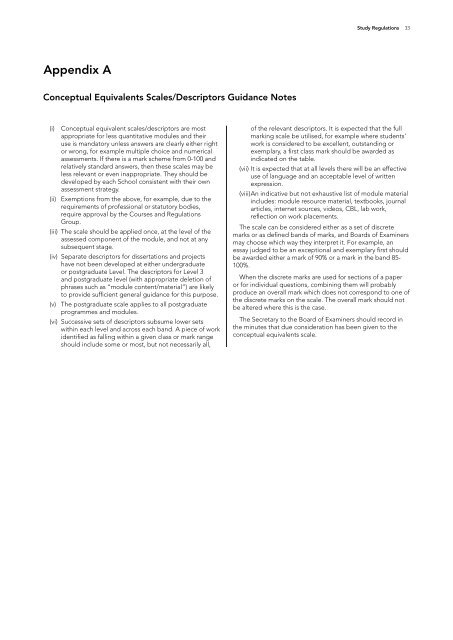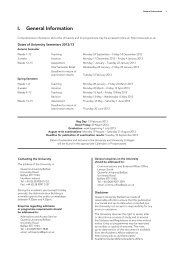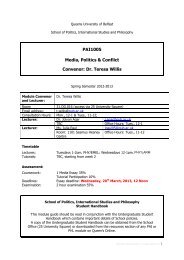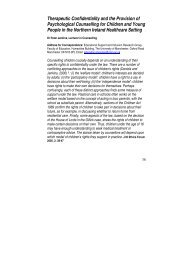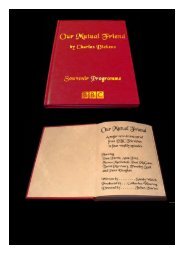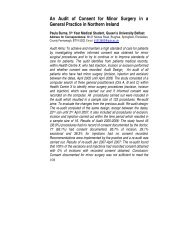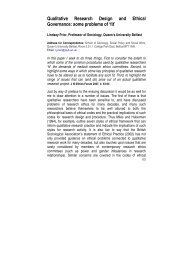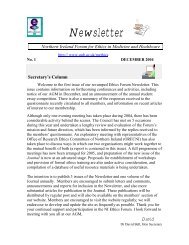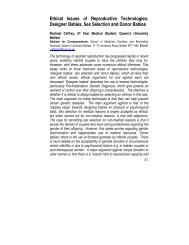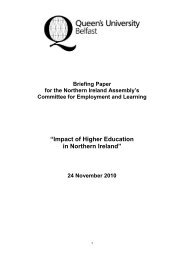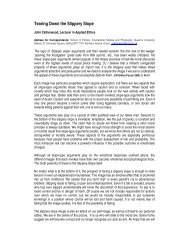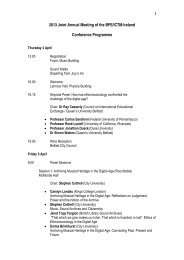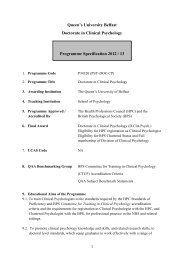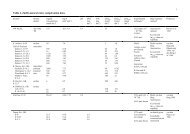University Calendar for Postgraduate Students 2012/13 - Queen's ...
University Calendar for Postgraduate Students 2012/13 - Queen's ...
University Calendar for Postgraduate Students 2012/13 - Queen's ...
Create successful ePaper yourself
Turn your PDF publications into a flip-book with our unique Google optimized e-Paper software.
Study Regulations 33<br />
Appendix A<br />
Conceptual Equivalents Scales/Descriptors Guidance Notes<br />
(i) Conceptual equivalent scales/descriptors are most<br />
appropriate <strong>for</strong> less quantitative modules and their<br />
use is mandatory unless answers are clearly either right<br />
or wrong, <strong>for</strong> example multiple choice and numerical<br />
assessments. If there is a mark scheme from 0-100 and<br />
relatively standard answers, then these scales may be<br />
less relevant or even inappropriate. They should be<br />
developed by each School consistent with their own<br />
assessment strategy.<br />
(ii) Exemptions from the above, <strong>for</strong> example, due to the<br />
requirements of professional or statutory bodies,<br />
require approval by the Courses and Regulations<br />
Group.<br />
(iii) The scale should be applied once, at the level of the<br />
assessed component of the module, and not at any<br />
subsequent stage.<br />
(iv) Separate descriptors <strong>for</strong> dissertations and projects<br />
have not been developed at either undergraduate<br />
or postgraduate Level. The descriptors <strong>for</strong> Level 3<br />
and postgraduate level (with appropriate deletion of<br />
phrases such as “module content/material”) are likely<br />
to provide sufficient general guidance <strong>for</strong> this purpose.<br />
(v) The postgraduate scale applies to all postgraduate<br />
programmes and modules.<br />
(vi) Successive sets of descriptors subsume lower sets<br />
within each level and across each band. A piece of work<br />
identified as falling within a given class or mark range<br />
should include some or most, but not necessarily all,<br />
of the relevant descriptors. It is expected that the full<br />
marking scale be utilised, <strong>for</strong> example where students’<br />
work is considered to be excellent, outstanding or<br />
exemplary, a first class mark should be awarded as<br />
indicated on the table.<br />
(vii) It is expected that at all levels there will be an effective<br />
use of language and an acceptable level of written<br />
expression.<br />
(viii) An indicative but not exhaustive list of module material<br />
includes: module resource material, textbooks, journal<br />
articles, internet sources, videos, CBL, lab work,<br />
reflection on work placements.<br />
The scale can be considered either as a set of discrete<br />
marks or as defined bands of marks, and Boards of Examiners<br />
may choose which way they interpret it. For example, an<br />
essay judged to be an exceptional and exemplary first should<br />
be awarded either a mark of 90% or a mark in the band 85-<br />
100%.<br />
When the discrete marks are used <strong>for</strong> sections of a paper<br />
or <strong>for</strong> individual questions, combining them will probably<br />
produce an overall mark which does not correspond to one of<br />
the discrete marks on the scale. The overall mark should not<br />
be altered where this is the case.<br />
The Secretary to the Board of Examiners should record in<br />
the minutes that due consideration has been given to the<br />
conceptual equivalents scale.


